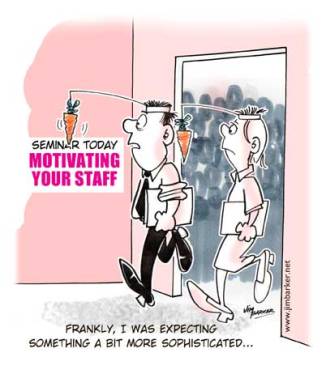Institutional Motivation: Inspiring and Retaining Talent
Institutional motivation is a key issue when assessing an organization. In today’s context it is even more important.
Organizations around the world are cutting back in a wide variety of ways, but few have considered how to motivate the talent they are keeping. Organizational assessments (OAs) which we have conducted suggest that they should. Our experience with international institutions, including NGOs, suggests that there is an assortment of leadership and organizational behaviours that can inspire talented staff to stay on and engage in their work to overcome short-term hardships (in other words to create the motivation to perform). Although not a panacea, engaging in these behaviors can offset some of the damage caused by lay-offs, pay reductions, job enlargements and so forth.
Our work in OA indicates that there are a set of recurring themes that are non financial in nature that help motivate employees to perform better, with better performing employees helping improve the performance of an organization. The most frequently mentioned behaviors are leadership praise, leadership attention (for example, one-on-one conversations), and opportunities provided to lead projects or task forces.
There couldn’t be a better time to use these cost-effective approaches to support your performance goals. Organizations face the challenge of retaining talented people amid morale-sapping layoffs. Often, top performers are the first to go. Strong talent management is critical to recruiting new talent, and the organizational culture is an incubator for talent.
Given the hard times we are presently going through, the question is why haven’t many organizations made more use of cost-effective motivators? One reason may be that many leaders have a tendency to “hibernate” during hard times − to reflect and engage in deep thinking. However, this lack of interaction between managers and their people creates a highly damaging void that saps employee engagement.
During these difficult times interaction is key. If a leader does not like face-to-face interactions, they might be more comfortable engaging with their staff by using a survey. In one recent survey, employees revealed that they were interested in organizational projects that supported their NGO’s environmental responsibility. In another, there were suggestions to have coffee meetings with senior management.
Staff are often full of ideas that can provide guidance to managers.
“One-on-one meetings between staff and leaders are hugely motivational,” wrote a staff member in a multilateral organization, “they make people feel valued during these difficult times.” By contrast, many respondents indicated that town hall meetings, corporate emails and large scale communications made them feel like just a “cog” in a big machine. Often these communication tools sound like spin.
Motivating staff during hard times is a key role of organization leaders. Inspiring the existing talent to perform at high levels is always a challenge, but particularly so during difficult times. It is one of the reasons that in our OA model  we always pay a lot of attention to the idea of “institutional motivation”. This refers to the underlying culture, values and norms that drive individual and organizational behavior.
we always pay a lot of attention to the idea of “institutional motivation”. This refers to the underlying culture, values and norms that drive individual and organizational behavior.
For over 30 
 years, Dr. Charles Lusthaus was a Professor in the Department of Administration and Policy Studies in Education at McGill University. During that time, he taught Educational Management courses in organizational theory and behaviour, strategic management, organizational development, planning, and monitoring and evaluation to over a thousand graduate students.
years, Dr. Charles Lusthaus was a Professor in the Department of Administration and Policy Studies in Education at McGill University. During that time, he taught Educational Management courses in organizational theory and behaviour, strategic management, organizational development, planning, and monitoring and evaluation to over a thousand graduate students.

Dr. Lusthaus is also a founding partner of the Universalia Management Group and is reputed for having pioneered an approach to institutional and organizational assessment (IOA). Today, the framework is used by a variety of international bodies including CIDA, IDRC, IDB, IUCN, and ILO.

No comments:
Post a Comment